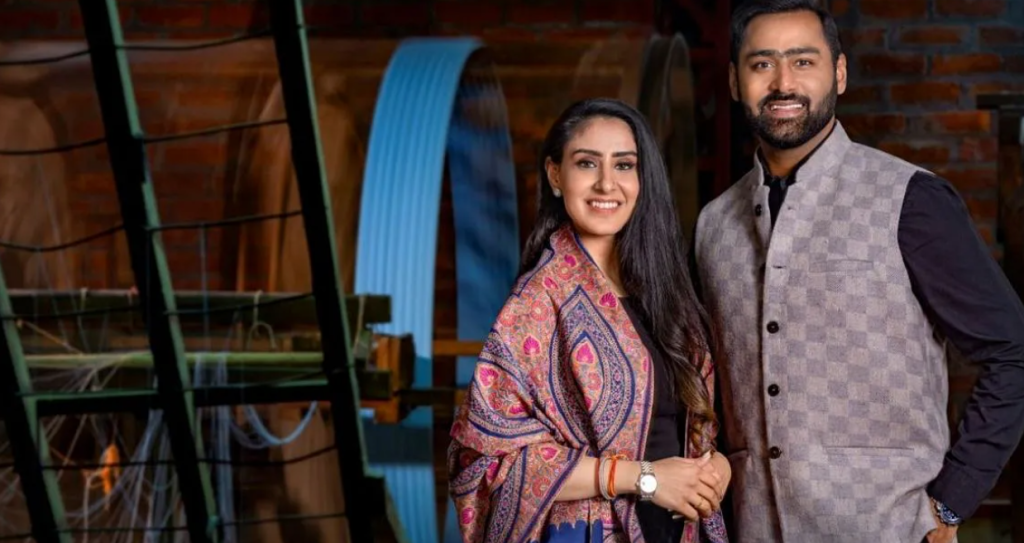
Indian Shawls Get Global Exposure: Entrepreneur Helps 1000 Weavers through Facebook Promotion
Date:

Share post:
“Pashminas are well known in Paris… I was unaware that “All of these shawls are largely created in India. Pranav Malhotra, managing director of Pashtush, an Amritsar-based company that exports Indian luxury shawls to other countries, giggles.
Only one of the 120 nations where Pashtush trades its hand-made goods is France. Pranav created the brand of high-end ties, scarves, and shawls for both men and women in an effort to carry on his family’s tradition. His great-great-grandfather began as a yarn trader, making his family one of the earliest shawl manufacturers in Amritsar. However, Pranav is the one who used digital to grow the company on a national and international scale.

Pranav claims that as a frequent traveller, his journeys let him realise how popular oriental goods were in the West, particularly shawls and stoles. He observes that the weavers and artisans at home weren’t being paid fairly.
Shawls and scarves are seasonal items, making it difficult for makers and weavers to maintain a consistent flow of money. In order to cut out middlemen and hire local talent, Pranav was inspired by a chance encounter with a skilled weaver who was selling sugarcane juice on the street.
“I noticed one of our extremely experienced and excellent karigars, who used to work with my father, as I was driving down to source some threads. I questioned him about his purpose for hawking sugarcane juice on the street. He informed me that the lockdown had caused him to lose his income. That is when we hired him and people just like him,” the 31-year-old claims.
When they created their website at the end of 2017, Pashtush was created. Its origins are in the words “Pashmina” and “tush,” both of which denote wool. A team of 30 to 40 workers carefully crafts each Pashtush shawl.
“Our shawls are not created in a single location. The beginning of their voyage is when we find the raw wool to turn into yarn, and from there they travel to the spinners, dyers, weavers, artisans, and sketchers who create the designs. Lastly, there are the embroideries. According to him, all of this takes place in and around the villages of Punjab, Kashmir, and Himachal Pradesh, providing income for thousands of households.
A Pashtush shawl also takes five to six months to make. He continues, “We urge the artisans to take their time with them, which is why this is the case.
Previously, the craftspeople would lose six months’ worth of income. However, Pranav asserts that they now make 2.5 times as much money using Pashtush. “Let’s say, for example, that an artist charged INR 10,000 to paint a shawl that was only intended to be worn for three months. They may now make money throughout the year, he claims.
Making 2,000 Products Come To Life
We had so much demand that we were looking for workers to hire throughout the lockdown, said Pranav.He continues, “When the pandemic hit, we had already doubled our revenue, and in the previous fiscal year, we grew at a 2.5x rate. Since our offline sales were down, all of these sales came from online.
According to Pranav, the company’s transition from a retail model to a direct-to-consumer one was made possible by Meta and its apps. According to him, “one Facebook post leads to thousands of queries from all over the world.”
Without Facebook and Instagram, because they let you tell a story, I could not have done our items justice. They give life to our 2,000 goods. It’s remarkable to see a single Instagram photo viewed by users all across the world. Particularly during the shutdown, the reach and influence that these platforms can have on an artist are tremendous, according to him.
Facebook and Instagram have given Pashtush and the brand’s creators a greater mission. “It would not have been possible in the normal setup to establish this group around people who have an interest in our goods and those who have similar interests and preferences, while simultaneously collecting live feedback,” he claims.
We discovered that WhatsApp is one platform we might use for client relationship management, particularly during the lockout. Even atypical buyers like my nani are paying attention. She is a devoted shopper but is unable to use a card or navigate the internet. In the past, she would need someone to place her orders. People like her can now click the WhatsApp button to instantly contact customer service representatives. That is how the buying experience is personalised, he claims.

Currently, Pashtush ships its goods throughout the entire nation as well as to Australia, New Zealand, and Latin America, where the winters are similar to Indian summers. Additionally, the US, UK, Europe, and the Middle East are among their marketplaces. We are among the few industries that export handicrafts to China on a net basis. We have a product named Kalamkari shawls in Hong Kong, and wholesalers love them, the man said.
When asked about intentions for the future, Pranav states, “We want to grow our digital business. After successfully establishing our company in the US and the UK, we will venture into undeveloped markets, such as non-English speaking nations. For our Spanish-speaking clients, we intend to create a separate Instagram and Facebook account.
